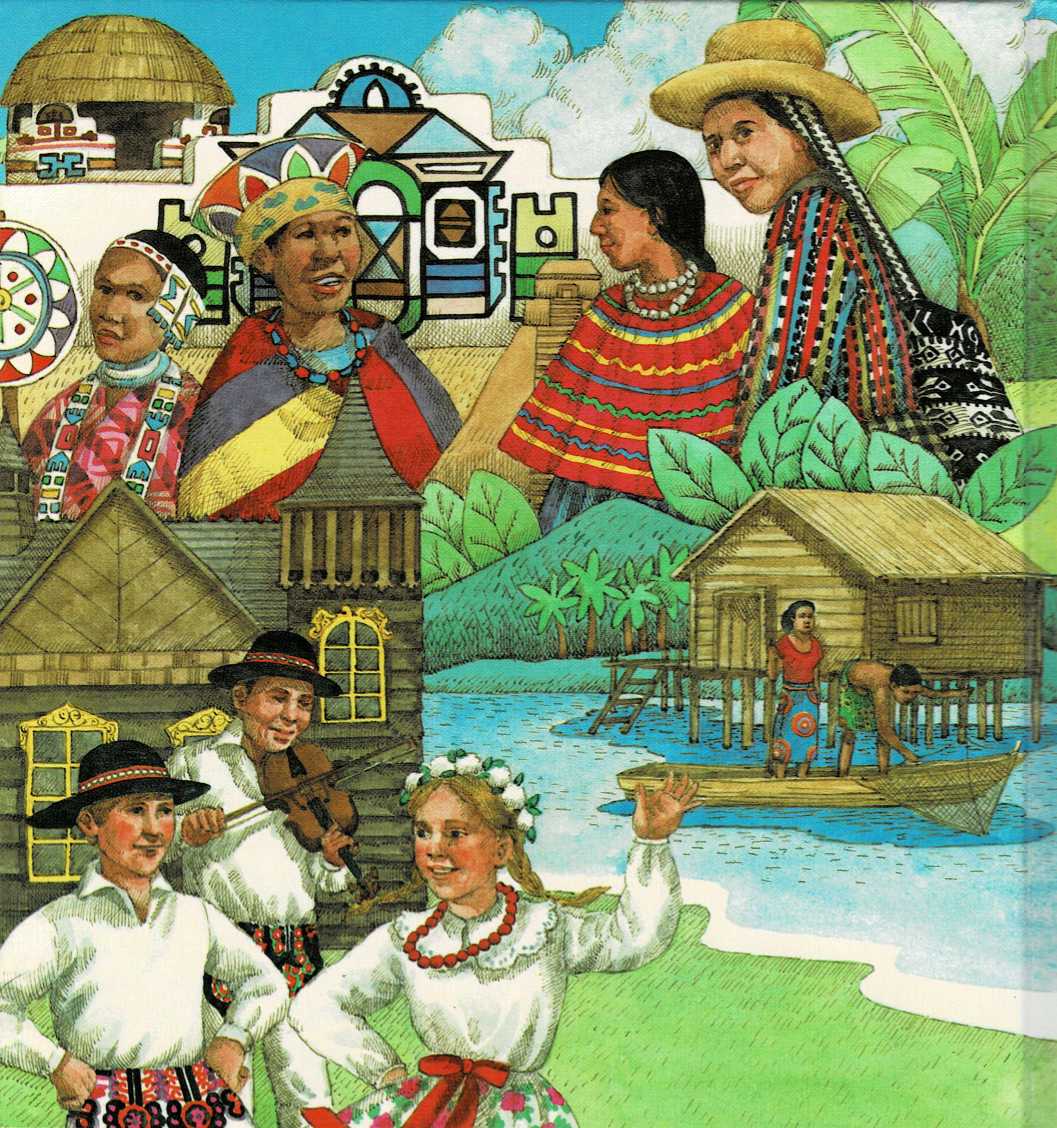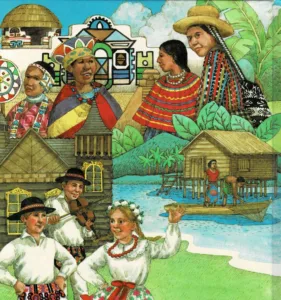New Words
Some of the words you have met in this book may be new to you. Many of
them are words you’ll meet again, so they are good words to know. Some
are the names of countries that may be hard for you to say. Here are
some of these words. Next to each word you are shown how to say it:
Aborigine (ab uh RIJ uh nee).
The part shown in capital letters is said a little more loudly than the
rest of the word. Under each word, the meaning is given in a complete
sentence.
Aborigine (ab uh RIJ uh nee)
The Aborigines are people whose ancestors were the first to live in
Australia, long ago.
adobe (uh [doh]{.smallcaps} bee)
Adobe is sun-dried brick. It is used as a building material.
Afghanistan (af GAN uh stan) Afghanistan is a mountainous kingdom in
southern Asia.
American Samoa (uh [mehr]{.smallcaps} uh kuhn su [moh]{.smallcaps}
uh)
American Samoa is a group of islands in the South Pacific Ocean.
amphibian (am [fihb]{.smallcaps} ee un)
An amphibian is an animal that lives both on land and in water.
ancient [(ayn]{.smallcaps} shuhnt)
Anything that belongs to times long past is ancient.
anthropologist (an thruh PAHL uh jihst) An anthropologist is a
scientist who studies people and the ways they live. A cultural
anthropologist studies people’s customs and beliefs. A physical
anthropologist studies the development of human beings, the bones of
prehistoric men, and the way living people look.
anthropology (an thruh [pahl]{.smallcaps} uh jee) Anthropology is
the scientific study of people and their ways of life.
Apache (uh PACH ee)
The Apache are a tribe of Indians who live in the American Southwest.
Appalachia (ap uh [lay]{.smallcaps} chuh)
Appalachia is the name given to a large area in the Appalachian
Mountains in the Eastern United States.
archaeologist (ahr kee [ahl]{.smallcaps} uh jihst)
An archaeologist is a scientist who studies people who lived long ago
and their ways of life.
archaeology (ahr kee [ahl]{.smallcaps} uh jee) Archaeology is the
scientific study of the tools, objects, customs, and beliefs of ancient
people.
artifact (AHR tuh fakt)
An artifact is a thing that was made by a human being.
astronomer (uh [strahn]{.smallcaps} uh muhr) An astronomer is a
scientist who studies the stars and planets.
Bali [(bah]{.smallcaps} lee)
Bali, an island in Southeast Asia, is part of the country of Indonesia.
bazaar (buh [zahr)]{.smallcaps}
In Asia, a bazaar is a section of a town where food, clothing, and other
things are sold.
Botswana (boh [tswah]{.smallcaps} nah) Botswana is a country in
Africa.
Buddha [(bood]{.smallcaps} uh)
Buddha was the man who began the Buddhist religion.
Buddhist (BOOD ihst)
A Buddhist is a person who believes in the teachings of Buddha.
ceremony [(sehr]{.smallcaps} uh moh nee)
A ceremony is the way people do things on special occasions such as
weddings or funerals.
chemical (KEHM uh kuhl)
Chemicals are the stuff out of which all things are made. Gases and
metals are chemicals.
civilization (sihv uh luh ZAY shun) Civilization is the way of life
of people who use art, science, and manners to help them live together
peacefully and comfortably.
Coyote (ky OH tee or [ky]{.smallcaps} oht) Coyote is a North
American Indian hero about whom many tales are told. Sometimes he is a
man and sometimes he is a coyote. (A coyote is a wild member of the dog
family. Coyotes used to live only in the West. They now live in most
parts of Canada, the U.S., and Mexico.)
culture (KUHL chur)
A culture is the way of life, the art, and the beliefs of a group of
people.
custom [(kuhs]{.smallcaps} turn)
A custom is the way a group has done something for a long time.
diorama (dy uh RAM uh)
A diorama is a small scene made by an artist or sculptor. It usually
shows figures of people or animals in real- looking surroundings.
Ethiopia (ee thee OH pee uh)
Ethiopia is a mountainous country in northeastern Africa.
fossil [(fahs]{.smallcaps} uhl)
A fossil is the hardened remains or traces of an ancient plant or
animal.
Ganges (GAN jeez)
The Ganges is a river in India. People of the Hindu religion regard it
as holy.
Ghana (GAH nuh)
Ghana is a country in western Africa.
hydrofoil (HY droh foyl)
A hydrofoil is a boat with fins on the bottom of the hull. At high
speed, the fins lift the hull out of the water.
This makes the boat go even faster.
icon [(eye]{.smallcaps} kahn)
An icon is a picture of Christ, an angel, or a holy person, usually
painted on wood or ivory.
immigrant (IM uh grunt)
An immigrant is a person who comes into another country to live.
incense (IHN sehns)
Incense is a mixture of woods and spices that gives off a sweet smell
when it is burned.
Iraq (ee [rahk)]{.smallcaps}
Iraq is an Arab country in Southwest Asia.
Islam [(ihs]{.smallcaps} luhm or ihs [lahm)]{.smallcaps}
Islam is the religion that was begun by Muhammad.
Korean (kaw REE uhn)
A Korean is a native of Korea, a country in eastern Asia.
Kuwait (koo [wyt]{.smallcaps} or koo [wayt)]{.smallcaps} Kuwait is a
small Arab country in Southwest Asia.
maize (mayz)
Maize is common corn. It is sometimes called Indian corn. Sweet corn and
popcorn are kinds of maize. In England, maize is the name given to all
kinds of corn.
mammal [(mam]{.smallcaps} uhl)
A mammal is an animal that has live babies instead of laying eggs. A
mother mammal feeds her baby with milk from her body.
Messiah (muh SY uh)
The Messiah, as foretold by the Jewish prophets in the Old Testament,
will lead all the Jewish people to peace and freedom.
minaret (mihn uh [reht)]{.smallcaps}
A minaret is a slender, high tower on a Muslim mosque.
minstrel (MIHN struhl)
A minstrel was a musician and singer who traveled from town to town
hundreds of years ago.
Morocco (muh RAHK oh)
Morocco is a small, mountainous country in northern Africa.
Mozambique (moh zuhm BEEK) Mozambique is a small country on the
southeastern coast of Africa.
Muhammad (moo [ham]{.smallcaps} uhd)
Muhammad is the man who began the religion of Islam.
Muslim [Imuhz]{.smallcaps} luhm)
A Muslim is a person who follows the religion of Islam, begun by
Muhammad.
Navajo or Navaho (NAV uh hoh)
The Navajo are a tribe of Indians who live in the American Southwest.
They are related to the Apache.
Nigeria (ny JEER ee uh)
Nigeria is a country in western Africa. It has more people than any
other African country.
nirvana (nihr VAH nuh)
Nirvana is the state of perfect peace and happiness into which Buddhists
hope to pass when they die.
nomad (NOH mad)
A nomad is a person who wanders from place to place and has no settled
home.
Norse (nawrs)
The Norse were the people of ancient Norway, Sweden, and Denmark.
orthodox (AWR thuh dahks)
An orthodox member of a religious group accepts the old beliefs and
ideas without wishing to change them.
Pakistan [(pak]{.smallcaps} uh stan)
Pakistan is a country in southern Asia.
It was once ruled as part of India.
Papua New Guinea (PAPoouh noo GIN ee) Papua New Guinea is an island
nation in the South Pacific Ocean.
parliament [(pahr]{.smallcaps} luh muhnt)
A parliament is a group of people who have been elected to make the laws
for their country.
physical (FIHZ uh kuhl)
Physical means “of the body.”
Polynesian (pahl uh NEE zhuhn) Polynesians are brown-skinned people
who live on many Pacific islands.
prehistoric (pree hihs TAWR ihk) Anything that took place before
people learned how to write—which was about 5,000 years ago—is said
to be prehistoric.
premier (prih [mihr]{.smallcaps} or [pree]{.smallcaps} mee uhr)
Premier is a title given to leaders in some countries. It means “first.”
proverb [(prahv]{.smallcaps} uhrb)
A proverb is a short, wise saying used for a long time by many people.
psychologist (sy [kahl]{.smallcaps} uh jihst)
A psychologist is a scientist who tries to find the reasons why people
behave as they do.
pueblo (PWEHB loh)
A pueblo is an American Indian village in the Southwest. The people who
built these adobe and stone villages are called Pueblo Indians.
Pygmy [(pihg]{.smallcaps} mee)
A Pygmy is one of a group of small, dark-skinned people who live in
parts of central Africa. Pygmies are usually between 4 and 5 feet tall.
social worker [(soh]{.smallcaps} shuhl WUR kuhr) A social worker
tries to help people better their living conditions and improve their
lives.
sociologist (soh see [ahl]{.smallcaps} uh jihst) A sociologist is a
scientist who studies how people live and work and get along together.
Sociologists want to know the causes of individual and group problems.
spiritual (SPEER uh chu uhl)
A spiritual is a type of religious song made famous by blacks in the
Southern United States.
Sri Lanka (SREE LAHNG kuh)
Sri Lanka is an island country in the Indian Ocean, near India. It used
to be called Ceylon (see [lahn).]{.smallcaps}
Sumatra (soo MAH truh)
Sumatra is an island in southeastern Asia. It is part of Indonesia.
synagogue (SIHN uh gawg)
Jews meet and worship in a building called a synagogue.
Tahiti (tuh [hee]{.smallcaps} tee)
Tahiti is an island in the South
Pacific Ocean.
Taiwan (ty [wahn)]{.smallcaps}
Taiwan is an island off the coast of China. Most of the people are
Chinese.
Thailand [(ty]{.smallcaps} land)
Thailand is a country in Southeast Asia. It was once called Siam.
torii [(tawr]{.smallcaps} ee ee)
A torii is the gateway to a Japanese Shinto shrine.
tortilla (tawr [tee]{.smallcaps} yuh)
A tortilla is a thin, flat, round corn cake eaten in Mexico, Central
America, and South America.
traditional (truh [dish]{.smallcaps} uh nuhl)
A traditional thing is something that has been handed down for many
years.
It may be a belief, a kind of music, clothing, or a way of doing
something.
turquoise (TUR koyz or TUR kwoyz) Turquoise is a blue or
greenish-blue stone often used to make jewelry.
Zaire [(zah]{.smallcaps} ihr)
Zaire is a country in the central part of Africa.
Illustration acknowledgments
The publishers of Childcraft gratefully acknowledge the courtesy of
the following artists, photographers, publishers, agencies, and
corporations for illustrations in this volume. When all the
illustrations for a sequence of pages are from a single source, the
inclusive page numbers are given. In all other instances, the page
numbers refer to facing pages, which are considered as a single unit or
spread. The words \”(left),\” \”(center),\” \”(top),\” \”(bottom),\”
and \”(right)\” indicate position on the spread. All illustrations are
the exclusive property of the publishers of Childcraft unless names
are marked with an asterisk (*).


